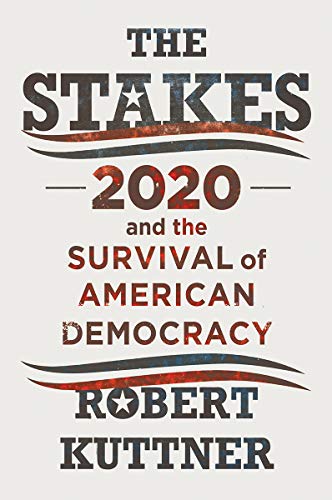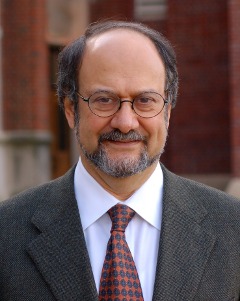Book Review: “The Stakes” — For America, Higher Than You Think
By Ed Meek
For America to get back on track, “It will take inspired radical leadership, mass organizing, and citizen mobilization of the kind that we see only in America’s finest hours.”
The Stakes: 2020 and the Survival of American Democracy by Robert Kuttner. Norton, 2019. $26.95

I’ve been a fan of Kuttner since he wrote for the Boston Globe back when the Globe had great op-ed writers like Ellen Goodman and Anthony Lewis. Now he edits The American Prospect and writes for Huffington Post. Occasionally you might hear him on NPR. In his new book, Kuttner makes a strong case for a progressive liberalism to get the country back on track and pull us off the edge of the cliff Donald Trump has us hanging over.
Although Democrats managed to win the House in 2018, Republicans still control the rest of the government — the Senate, The White House, and thanks to Mitch McConnell, the Judiciary. In fact, the right has been, in effect, collapsing the three branches of government to institute one-party rule. In addition, Republicans control most state legislatures and governorships. What’s really strange about this concentration of power is that they are a minority party — losing the popular vote in the Presidential election as well as in a number of state elections, but winning because of the electoral college, gerrymandering, and voter suppression. The result is unpopular tax transfers to the rich while defunding and undermining healthcare; implementing draconian immigration policies that lock up refugees and separate families; and the removal of basic protections for clean air and water. Not to mention enabling the free rein of Wall Street, propelling the strategies of banking and finance that led to the financial collapse of 2008 and the bailout that followed.
In his new book, Kuttner analyzes the state of the country on “the brink of something close to incipient fascism — an alliance between an autocratic government and a financial oligarchy, relying on extreme nationalism.” According to Kuttner, what we need is a “set of policies at least as radical as those of Franklin D. Roosevelt.” We are in this fix, he argues, because since the New Deal we have slipped backwards, with both parties abandoning the working class, undermining unions, and presiding over the growing disparity between the rich and everyone else.
One of the positive aspects of our era is that an enormous amount of information is available to us. There is, in fact, too much information out there for us to process. Worse, a lot of it is fake news and mindless entertainment. It is almost as if there is a conspiracy among the powerful to keep us distracted with sports and movies and ginned up controversies that don’t really matter. Not to mention the horrific news that comes along every day. Newspapers and news media do not do an effective job of connecting the corporate/conservative dots or giving us dissident perspectives. Luckily, we have writer/researchers like Kuttner to do that.
For Robert Kuttner, progressivism offers the way forward. He argues that “the great submerged issue in American politics has been the dominance of both presidential parties by Wall Street.” Obama, who remains popular, made the mistake of bailing out Wall Street and letting irresponsible, unethical, and sometimes criminal players from AIG, Bank of America, JP Morgan Chase, Fannie Mae, and Freddie Mac off the hook while, as Kuttner reminds us, ten million Americans lost their homes. People don’t like it when the elite go unpunished and ordinary citizens pay the price of their mistakes. It creates a lot of resentment against candidates like Hillary Clinton who have close ties to the big banks.

For Robert Kuttner, progressivism offers the way forward.
In a chapter entitled “Democracy: A Damage Assessment,” Kuttner points out that, starting with Ronald Reagan and going on to George Bush, the Executive Branch has been steadily increasing its power. Reagan cut taxes, grew the deficit, and broke the Air Traffic Controllers union. Bush invaded Iraq under false pretenses and encouraged deregulation with lack of oversight to foment the Great Recession. Bush also consolidated government power after 9/11 with the Patriot Act, which led to our current surveillance state. Obama kept the ball rolling with the bailout, drones, and signing statements. Kuttner also talks about Republicans’ successful exploitation of racism and voting requirements, attracting whites while disenfranchising African-Americans. He goes into the corruption of our system through the Citizens United Decision, which opened the spigot for dark money to flow into politics.
Is all hope lost then? According to Kuttner, progressivism offers a way out of this morass. He sees signs of this in the 2018 midterm elections in which democratic candidates won the House promising to raise the minimum wage and provide healthcare. He is also convinced that pocketbook issues are the key to Democrats taking back control of the government. He is a fan of expanding Medicare, strengthening unions, reducing the cost of state universities, and bringing back a progressive income tax. His bottom line: Democrats can win if they act in the interests of the American people, not the corporate class.
Kuttner also has significant suggestions for Democrats should they win the Presidency and the Senate. He wants a focus on a few big projects: infrastructure, wages, good jobs, and healthcare. Most of these progressive stances should appeal across party lines — unless they are undercut by identity politics and political correctness. The well-educated left has a blind spot when it comes to these matters, wanting to decriminalize border crossings, associating guns and religion, and referring to people as deplorables. For America to get back on track, Kuttner writes, “it will take inspired radical leadership, mass organizing, and citizen mobilization of the kind that we see only in America’s finest hours.”
Ed Meek is the author of Spy Pond and What We Love. A collection of his short stories, Luck, came out in May. WBUR’s Cognoscenti featured his poems during poetry month this year.
